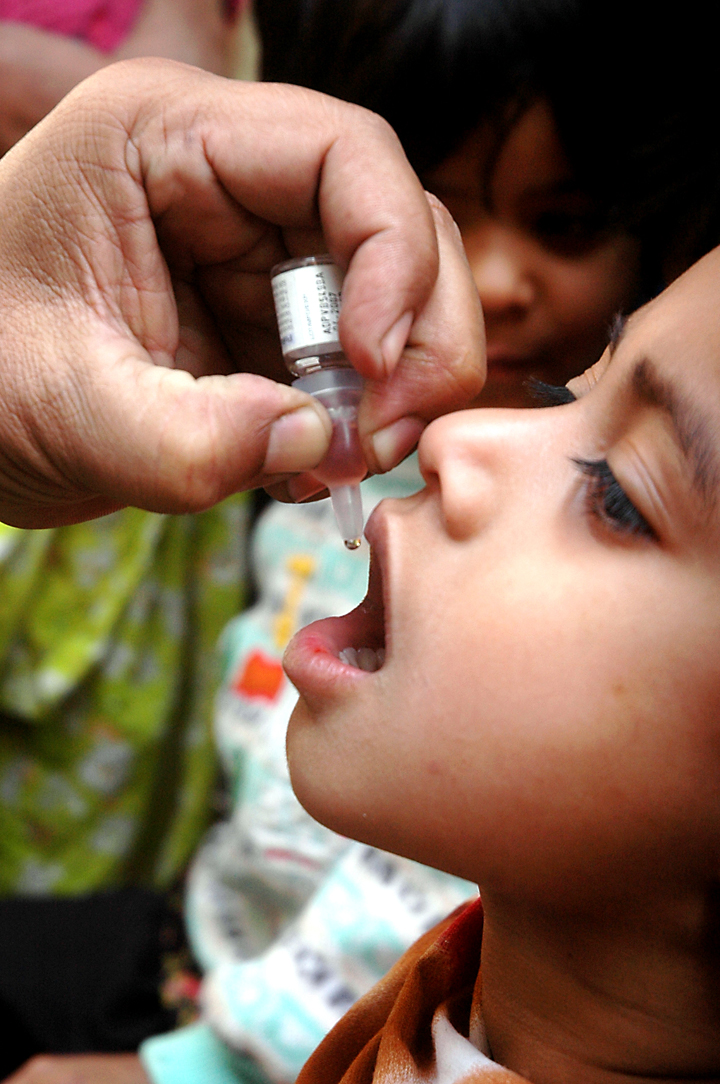Following the detection of another polio case in the southern Pakistani province of Sindh, this time in the Mirpurkhas area (also prone to malaria), there have been suggestions that the anti-polio drive in the province is facing significant difficulties.
The confirmation by doctors on 1 May that a two-year-old child had tested positive for the polio virus brings to five the number of cases of the disease in Sindh Province in 2008.
Nineteen positive polio cases have been found across Pakistan in the past six months. At the end of April, an 11-year-old girl in Karachi, Sindh’s capital, was diagnosed as having polio.
The emergence of new positive cases in Sindh has triggered urgent meetings between WHO representatives and Sindh health officials to discuss the situation.
"Decreasing resistance levels may be a factor in the case in Karachi," Mazhar Khamisani, director of the Expanded Programme on Immunisation, Sindh, said.
He said the affected girl, who was paralysed on one side of her body, lived in a north Karachi locality where there was also a sizeable population of people coming in from other parts of the country, and some of them may have transmitted the infection to the child.
Pakistani health officials have repeatedly said the polio virus was being brought into the country by Afghans moving across the border.
Like Pakistan, Afghanistan remains one of only four polio-endemic countries in the world. The others are Nigeria and India.
A new programme to vaccinate children at special stations set up on major highways is now being initiated with the support of traffic police.
"This may help ensure coverage for all children, since many travel to Karachi, Hyderabad and so on from other parts of the country," the national manager, Expanded Programme on Immunisation, H. B. Menon, said.
Meanwhile, health officials in the North West Frontier Province (NWFP) have been meeting to discuss the possibility that around 10,000 children may not have been immunised during the most recent anti-polio drive on 8-10 April, due to the refusal of parents to have them vaccinated.
Such refusals have remained a major obstacle in the highly conservative NWFP, where parents insist it is against their “tradition” to allow vaccinators into homes.
Rumours that “Western” anti-polio vaccines are intended to render children sterile, add to the problem.
According to reports in national newspapers, targets set for vaccinations have been missed in Lakki Marwat, Mardan and Bannu districts of the NWFP.
Abdul Waheed Khan, deputy director Expanded Programme on Immunisation, said the issue was being “reviewed”.
The NWFP government is also reported to be considering the possibility of enlisting the help of school children and teachers to help counter inaccurate notions about the anti-polio vaccine.
 Photo: David Swanson/IRIN  |
| Polio victim Kamran Khan, 14, in Islamabad, says his father still cries when he sees him crawling along the ground - angry that he hadn't vaccinated him against polio when he was younger. |
In Sindh, however, the problem seems to be rooted not in the attitude of parents but in the effectiveness of the vaccination strategy and a possible failure to reach all children. Experts have said the polio positive cases raised “questions” about the management of the campaign in Sindh.
The issue of coverage in Sindh has been regularly raised in recent months and was also discussed, according to health department sources, at a meeting of the technical advisory group on poliomyelitis eradication in Afghanistan and Pakistan, held in Cairo in the first week of February.
At the meeting, the apprehension was voiced that in some localities in the province, only around 95 percent of children were being vaccinated. A lack of proper supervision of vaccinators was cited as a possible reason for this.
The provincial secretary of health, Malik Asrar Hussain, agreed there was a need to "tighten loopholes and improve supervision". A series of planning sessions is now under way to determine how this can most effectively be done.
kh/at/ar/cb
This article was produced by IRIN News while it was part of the United Nations Office for the Coordination of Humanitarian Affairs. Please send queries on copyright or liability to the UN. For more information: https://shop.un.org/rights-permissions





